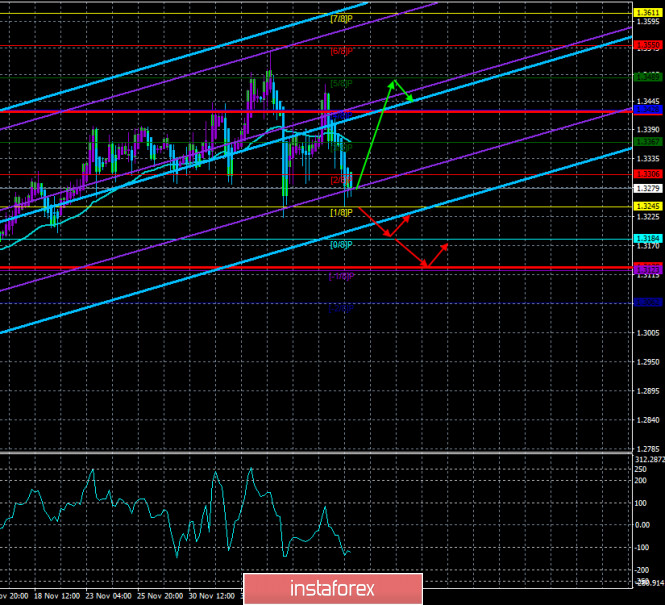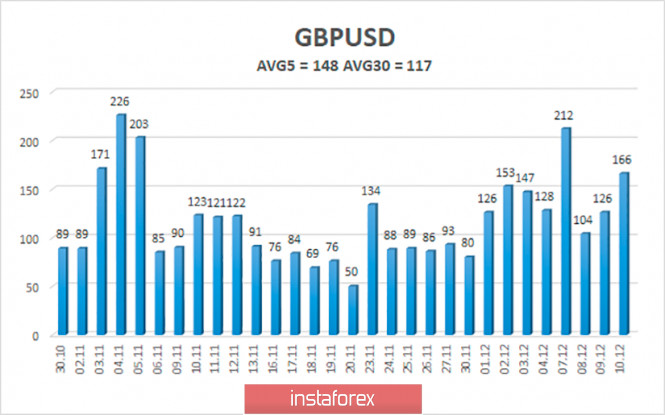4-hour timeframe

Technical details:
Higher linear regression channel: direction - upward.
Lower linear regression channel: direction - upward.
Moving average (20; smoothed) - sideways.
CCI: -123.7614
While the British pound continues to bounce from side to side, Ursula von der Leyen and Boris Johnson held a special meeting dedicated only to the trade deal. Naturally, the two leaders failed to agree on anything, which was clear even before the meeting. If Michel Barnier and David Frost have been negotiating almost daily for more than six months, what are the chances that Johnson and von der Leyen will resolve all their differences in three hours? Of course, no. This was an extremely formal meeting, which ended with statements from both sides that serious differences remained on key issues. Even the wording could not surprise traders, because they have been hearing it for a couple of months every day from all participants in the negotiation process and diplomats close to them.
British Prime Minister Boris Johnson once again blamed the European Union in a very mild form that it does not want to provide Britain with a deal like the Canadian one. Johnson said that the European Union intends to keep Britain "on a short leash", as it wants to remain tied to European laws and regulations. In practice, this means that if a new law is adopted in the EU, a similar law will have to be adopted in Britain, otherwise - prosecution. Secondly, says Boris Johnson, the EU wants the UK to become the only country in the world without full control over its waters. "I don't think such conditions would be acceptable for any Prime Minister of this country," Johnson said. However, the British Prime Minister did not say anything about the fact that it is the Kingdom that wants to maintain access to the huge European market since more than 50% of exports from Britain are sent to EU countries. But the EU is not so much interested in the British market for obvious reasons. Thus, London wants to stay in the EU, as it were, by leaving it. Continue to enjoy the main privilege of EU membership, without being in the Alliance itself, without paying contributions to the common Treasury. London's position is also far from the concept of "compromise". But on the future of Britain, Johnson said that "the country will still be a magnet for foreign investment and will thrive regardless of the outcome of negotiations with the EU."
At the same time, both sides announced a new deadline for negotiations. This time it's December 13, which is Sunday. Until that day, the groups of Michel Barnier and David Frost will continue to negotiate, but on December 13, a point must be put: either the negotiations will be considered a failure and Brexit will take place according to a "hard" scenario, or the continuation of negotiations will be announced, as a possible compromise will be visible. At least, this is the wording that came from official European and British sources. And now, dear traders, think about the second point. That is, on Sunday, whatever the result of a few more days of negotiations, the parties can again declare that they "see a possible compromise" and want to extend the negotiations for a few more days/weeks. Then the year 2021 will come and London and Brussels can "retroactively" extend the "transition period", calling it whatever the press wants. The fact remains. In 2019, the trade turnover between the UK and the EU amounted to $ 900 billion. Almost 1 trillion. And here you should clearly understand what are the WTO rules and how to trade under them.
The WTO rules mean certain tariffs and duties for each group of goods. In practice, this means that if the British car industry now supplies cars to the EU for $ 20,000 per unit, then the same car after Brexit will cost 23-25 thousand dollars in the EU. And the competitors' prices will remain the same. In other words, it cannot be concluded that British car manufacturers will lose 5-10% of the European market. They will lose much more, or they will be forced to seriously lower selling prices for the European market to neutralize the effect of duties. And this again threatens with monetary losses. Thus, Boris Johnson continues to make statements from the category "We are not afraid of Brexit No Deal". Personally, the British Prime Minister may not be afraid, but British business is very afraid and begs the government to agree on a deal with the European Union. Andrew Bailey, the head of the Bank of England, has been sounding the alarm for several months in a row, as he best understands what a "hard" Brexit will mean for the British economy. By the way, there are no forecasts for the fourth quarter of British GDP yet, but there is no doubt that it will decrease since the quarantine was in effect in Foggy Albion.
Well, the British pound, with this "wonderful" fundamental background, continues to trade near its 2.5-year highs. This suggests that traders continue to believe in the conclusion of a trade deal or the topic of Brexit and trade negotiations have nothing to do with it at all. We have already said that there may be major players in the market right now who are trading the euro and the pound for their reasons, which do not depend on the fundamental background. Because if we take into account the "foundation", the pound should have been flying towards its annual lows for a long time. But not the other way around. However, market participants may be simply waiting for a statement that the negotiations have failed, and only after that, they will begin to massively get rid of the pound. Now the "transition period" continues to operate, negotiations continue. And the ease with which London and Brussels move deadlines gives hope that sooner or later the agreement will still be signed. But trading the pound/dollar pair now is very difficult. The "high-volatility swing" is preserved.

The average volatility of the GBP/USD pair is currently 148 points per day. For the pound/dollar pair, this value is "high". On Friday, December 11, therefore, we expect movement inside the channel, limited by the levels of 1.3129 and 1.3425. A reversal of the Heiken Ashi indicator back up signals a new round of upward movement.
Nearest support levels:
S1 – 1.3245
S2 – 1.3184
S3 – 1.3123
Nearest resistance levels:
R1 – 1.3306
R2 – 1.3367
R3 – 1.3428
Trading recommendations:
The GBP/USD pair on the 4-hour timeframe is now in a new round of downward movement. Thus, today it is recommended to stay in short positions with targets of 1.3245 and 1.3184 until the Heiken Ashi indicator turns up. There is a high probability of a rebound from 1.3245. It is recommended to trade the pair again for an increase with targets of 1.3428 and 1.3489 if the price is fixed back above the moving average line. In general, high-volatility "swings" are continuing now. This is not a good time to trade.
The material has been provided by InstaForex Company - www.instaforex.com